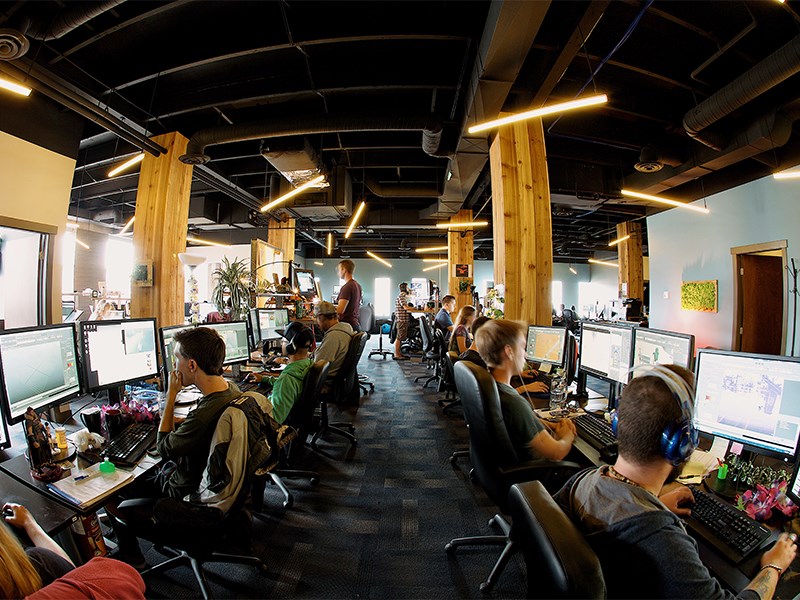In an industry that confuses and confounds with its linguistic lexicon, a tech hub or incubator is as difficult to define as any in the wide range of computer terms. For that reason, many people in Powell River are not finding the creation of a local tech hub easy to comprehend, according to individuals and organizations behind the project, such as Powell River Makerspace, operated by Powell River Technology Co-op.
The co-op’s purpose is to promote technological product development in the region and build a strong community and diverse local technical economy.
In January, Makerspace gave a presentation to Powell River Chamber of Commerce and expressed its desire to help grow a technology economy here, said Makerspace co-founder and Engage Data owner Theo Rosenfeld, who is one of Powell River’s growing number of technology telecommuters.
Immediately afterward, Rosenfeld said he and Makerspace co-founder Thomas Gray were approached by City of Powell River economic development manager Scott Randolph and Vancouver Island University (VIU) Powell River campus administrator Greg Cran about working together to make the hub a reality.
Rosenfeld said the idea took off very quickly, as did the mumbo-jumbo.
“The labelling of it will be a place for businesses, individuals, students and people wanting to develop technology skills, as ideas for products or services that could be built, and share resources, knowledge and collaborate together,” said Rosenfeld.
If it sounds to some people like the hub will be all tech to all people and if they build it, they will come, School District 47 superintendent Jay Yule said that misses the point.
“If you don’t have a place, you can’t show people and you can’t discuss what it involves,” said Yule. “How are you going to attract people?”
When Randolph, Yule and Cran presented the tech-hub proposal on paper to City of Powell River’s finance committee, it raised more questions than answers.
What is known is the city is being asked for a $200,000 grant from Powell River Community Forest for development of the hub at the new Townsite Market.
“We’re looking to work with the tech industry in Vancouver,” said Cran, “especially True North, to see whether or not we might be able to attract some of the startups, in particular from Silicon Valley, who are looking to relocate.”
True North manages immigration to Vancouver for employees in the United States who are uncertain about their future employment status because of the new Trump administration being unwelcoming to foreigners.
Vancouver has its own set of problems holding onto employees in information and technology sectors, not the least of which is housing prices. Powell River offers affordable housing, high-speed, fibre-optic internet connections and enviable lifestyles.
The parties involved, including the school district’s non-profit Powell River Education Services Society, VIU, Makerspace and the city, admit there have been many misunderstandings and few details, not the least of which is: what will it look like?
The hub will occupy 8,000 square feet of Townsite Market, which is currently under construction. A Silicon Valley “campus,” with an open concept is close to what the hub might look like, according to Rosenfeld.
“We’re wary of being too prescriptivist and mandating that it be the way we imagine it,” said Rosenfeld, “because the core idea of the space is that it would enable community and business collaboration.”
Rosenfeld added that the details of how it comes together are going to have to be up to community members and businesses that participate.
There is also confusion regarding information or understanding what the parties are trying to do with the educational component, said Yule.
“We don’t want education and training taking the lead, but my feeling is, if somebody doesn’t stand up and try to put some structure to have some space available, how do we get started?” he added.
Yule said the district and VIU are willing to look at currently available technology education programs and expanding them for the hub.
“We recognize all the world-class education happening is a melding of schooling and industry,” he said. “I want our students to have real access to real tech companies and real education training support.”
According to city councillor Russell Brewer, the technology hub is not unlike many of the issues city hall faces: in some ways it is really complicated and in other ways it is very simple. Brewer, who chairs the finance committee, said despite having only been presented with a relatively vague proposal and brief, two-page budget, he likes the idea.
“The partnership piece between the city, school district and VIU makes a lot of sense,” said Brewer.
Brewer added that the partnership between VIU and the school district to bring the hub forward is not a private business applying for funding; it is those organizations.
Cran said the hub is not about people who design websites, because those designers can and often do work from home.
The technology hub is looking for people who can see or create opportunities around projects within other industries, such as aquaculture and forestry, because tech connects, said Cran.
“Through idea, innovation and entrepreneurship, we’re looking to create new possibilities where they can learn how to connect to a network or a market,” said Cran. “We’re going to make it work.”



